calsfoundation@cals.org
Pleasant Plains (Independence County)
| Latitude and Longitude: | 35°33’00″N 091°37’34″W |
| Elevation: | 604 feet |
| Area: | 1.02 square miles (2020 Census) |
| Population: | 352 (2020 Census) |
| Incorporation Date: | May 25, 1907 |
Historical Population as per the U.S. Census:
|
1810 |
1820 |
1830 |
1840 |
1850 |
1860 |
1870 |
1880 |
1890 |
1900 |
|
– |
– |
– |
– |
– |
– |
– |
– |
– |
– |
|
1910 |
1920 |
1930 |
1940 |
1950 |
1960 |
1970 |
1980 |
1990 |
2000 |
|
151 |
116 |
135 |
156 |
153 |
112 |
162 |
267 |
256 |
267 |
|
2010 |
2020 | ||||||||
|
349 |
352 |
Pleasant Plains is a town located on U.S. Highway 167 between Bald Knob (White County) and Batesville (Independence County). Although it is not as old as Batesville, Pleasant Plains is one of the oldest settlements in Arkansas, with origins in the territorial period.
Families traveling in covered wagons came into Missouri and Arkansas, following the Southwest Trail until they found promising land that was unclaimed. The earliest settlement, which called itself Fairview, was located about two miles north of the present Pleasant Plains. The first settlers wrote to their relatives about the bounty of their new home, with prairie chickens and eggs, wild berries (particularly strawberries), and good timber for firewood and for construction. When the settlers applied for a post office in 1842, they were told that the name Fairview was already being used in Arkansas, so they accepted Pleasant Plains as their second choice.
More families arrived before the Civil War, including the Siler family, which came from North Carolina. The community was not as devastated by military activity during the war as the nearby larger town of Batesville. Nevertheless, the call to arms took many men off the farms, leaving the farms less well tended. Recovery after the war took several years. The post office, discontinued in 1866, was reestablished in 1870. As the community grew, a school called the Academy was established. The Academy lasted as a private school until 1892, when it was replaced by a public school. The Academy building remained abandoned until around 1917, when it was converted to a Baptist church after the first Baptist church building in Pleasant Plains was destroyed by fire.
Cotton and corn were the chief crops of the area for many years. The St. Louis, Iron Mountain and Southern Railroad arrived in Independence County in 1883 and probably inspired the population to resettle at the town’s present location. Pleasant Plains officially incorporated in 1907.
Early in the twentieth century, the town included two or three stores, a post office, a barber shop, and a blacksmith shop. In addition to the Baptist congregation, there was also a Methodist church and a Church of Christ. An Assembly of God was later established in the town. Construction of U.S. Highway 167, beginning in 1926, brought more traffic through the town. A new school building was erected in 1932, but that building burned to the ground in 1938. The Works Progress Administration (WPA) built yet another schoolhouse, which survived twenty-five years before burning down in 1963.
Despite its name, Pleasant Plains had a history of violence. According to local historian Ivy Wright: “Pleasant Plains seemed early to be destined to be a meeting place for the purpose of settling personal differences. More than one killing has been committed there, usually by feuding parties from adjoining communities.”
Electricity first came to Pleasant Plains in 1939. The town had a drugstore with a soda fountain, and at least one doctor lived in Pleasant Plains in any given year. By 1970, Pleasant Plains had three stores, two gasoline stations, a beauty shop, a poultry station, a feed and egg plant, and a community center. Nearby, along Highway 167, were a “washateria” (laundromat), a car wash, a second beauty shop, another feed and egg mill, two garages, and an electrician’s shop. Poultry, hay, and soybeans replaced cotton and corn as chief crops. The school was consolidated into the Midland School District in 1985.
By the start of the twenty-first century, the churches and the businesses along the highway were the lifeblood of Pleasant Plains. In 2015, Pleasant Plains had a Baptist church, a Methodist church, and an Assembly of God, as well as three nondenominational churches. The town also has a gas station, two restaurants, a tobacco and tackle shop, a furniture store, a saddlery, a used-car lot, and a pawn shop.
In 2010, Pleasant Plains received unfavorable attention nationally when a member of the Midland school board made disparaging remarks about gay people on a personal Facebook page. Protesters picketed the board meetings until the school board member resigned.
For additional information:
Wright, Ivy, and Denetrice Hutchins. “A Short History of Pleasant Plains.” Independence County Chronicle 11 (July 1970): 51–60.
Steven Teske
Butler Center for Arkansas Studies
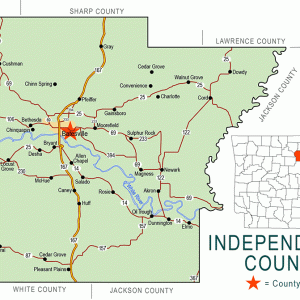 Independence County Map
Independence County Map 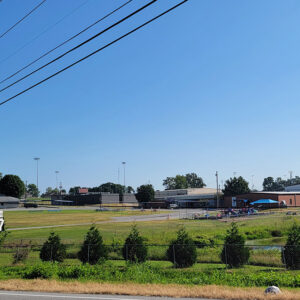 Midland School District
Midland School District 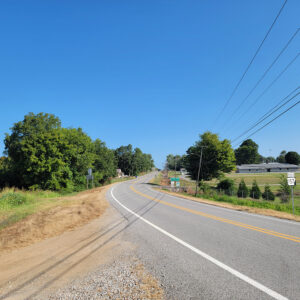 Entering Pleasant Plains
Entering Pleasant Plains 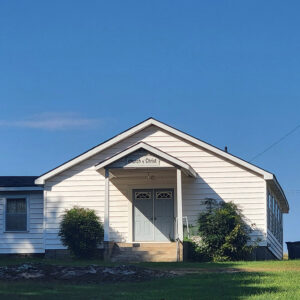 Pleasant Plains Church
Pleasant Plains Church 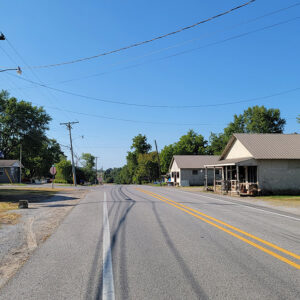 Pleasant Plains Street Scene
Pleasant Plains Street Scene 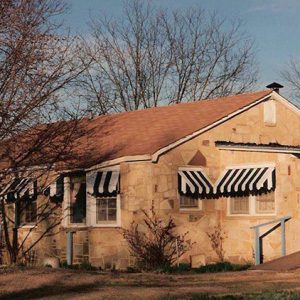 Stork Inn
Stork Inn 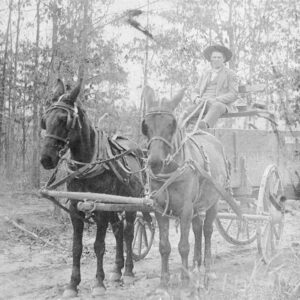 William Woodyard
William Woodyard 




Comments
No comments on this entry yet.